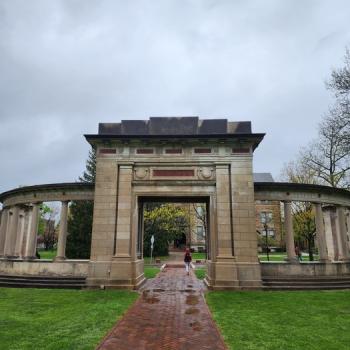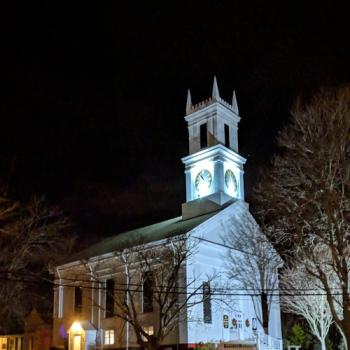My family was recently near the campus of UT Dallas and decided to go for a walk. It’s not going to make a list of the most beautiful colleges in America, but it has rows of magnolias overlooking a line of fountains that made it a nice place for young kids to run around. I couldn’t help but notice a couple things on the campus: the automated food delivery robots parked by some of the buildings (sadly I didn’t get to see them in action) and the billboards put up everywhere for a group called FOCUS.

Now, I’m familiar with a ministry called FOCUS, the Fellowship of Catholic University Students. It has a conservative reputation and seems to borrow techniques from the big evangelical student ministries. However, a little bit of googling revealed that this group was not the Fellowship of Catholic University Students, but rather the Fellowship of Christian University Students, an evangelical group with ministries to various colleges in the Dallas-Fort Worth metroplex.
This wouldn’t be all that weird were it not for the fact that UT Dallas also has a chapter of the Catholic FOCUS. Both are clearly quite active and they have exactly the same name.
From a completely uninformed vantage point, it just seems like a terrible idea. You could easily imagine a conversation between students that started something like this:
“Hey, you know I’m involved in FOCUS. We’ve got a Bible study this evening. Wanna tag along?”
Presumably there are many students who would be much more likely to attend a Catholic gathering than an evangelical one, or vice versa, and I can imagine that more than a handful of freshmen have gotten very confused. It seems to violate the principles of Branding 101.
Maybe for the purposes of these ministries, a little bit of accidental ecumenism isn’t the worst thing, but I’m sure they’d rather the problem would just go away.

Wheatons, Northwesterns, and Bethels
There are plenty of colleges with the same problem. I’m sure Wheaton College (Illinois) would much rather that Wheaton College (Massachusetts) simply abandon the name to the better-known evangelical school.
A decade ago, Northwestern College (Iowa) and Northwestern College (Minnesota) struggled with the same issue, only amplified by proximity and overlapping applicant pools. The easy way out (becoming Northwestern University) was foreclosed by an 800-pound gorilla just to the southeast in Illinois. In the game of chicken that ensued, the Minnesota school (once led by Billy Graham) yielded first and became the somewhat ungainly and certainly ungrammatical University of Northwestern-St. Paul.
Some of these problems were probably less pertinent when education was more regionalized and denominational affiliation more important (which of the four Bethels you meant probably depended where you lived and whether you were a Mennonite, Baptist, Cumberland Presbyterian, or member of the Missionary Church). When education was less globalized, it would have been harder to confuse the American Manchester or Heidelberg for their more famous European namesakes.
The Death of the Christian “College” and the “Baptist” University
Colleges do change their names. Apparently believing that “college” implies “community college,” seemingly the entire field of “colleges” outside of the elite liberal arts colleges have used their (normally sparse) graduate offerings as an excuse to claim university standing. Christian colleges have been among the most enthusiastic participants in this trend (I still find that Calvin University grates on the tongue).
Others adopt completely new names: Humboldt State recently became Cal Poly Humboldt, Philadelphia Biblical University became Cairn a decade ago, and, in 2017, somewhat bizarrely, a Catholic university, the uniquely named University of Great Falls in Montana, chose a name, “the University of Providence,” that could only create confusion with the much better known Providence College.
There are always strategic reasons for these name changes, although I’m not sure they are all well-advised: Houston Baptist, for example, likely wanted to broaden its appeal to the growing cohorts of non-denominational Christians who might prefer to attend the now-renamed “Houston Christian University.” But the “Christian” label in universities has long signaled the Stone-Campbell tradition, whether that means the relatively conservative Church of Christ schools or the almost completely secular Texas Christian University, so Houston Christian, Louisiana Christian, and Arizona Christian have inherited some potentially confusing baggage.

I have no idea whether the other universities with “Baptist” in their name will join in the trend of jettisoning the name. It reminds me of the time in the early 2000s when seemingly every other church in my hometown removed their denominational moniker and became “The Well,” “The Connection,” or “LifeBridge.” Perhaps it makes some degree of sense: Baptists are normally Christians as well and Baptist donors and alumni likely understand the reasons for widening their applicant pool amidst a cutthroat competition for students among private colleges.
Louisiana Christian University might be the most interesting of the bunch, because it was previously known, not as “Louisiana Baptist University,” but as “Louisiana College,” a name which seemed to me to signal a certain kind of grandeur–not many colleges have the audacity to claim to be the college for their state. Even though any prospective student who investigated would find that the college was self-consciously Christian and Southern Baptist, its leadership apparently decided that being a “university” and doubling down on its religious identity were more important than whatever reputation it had built up over more than a century as Louisiana College.
When Rebranding Falls Flat: Mississippi Brightwell University
The most embarrassing saga over renaming is going on in Mississippi, where Mississippi University for Women (“the W”), coeducational since 1982, is desperately trying to find a non-gendered alternative. A committee chose the name “Mississippi Brightwell University,” which, if the university’s founder, or a prominent president, or the first student to integrate the school, had borne the last name Brightwell, would be a lovely new moniker.
Alas, the name was completely made up, a mishmash of “bright” (because their motto talks about “light”) and “well” (because they train a lot of nurses). The idea might have worked for a subdivision or a nursing home, but it’s hard to see why alumni would get on board with something so bloodlessly insipid.
Fortunately, the administration is now walking back the proposal. Far more sensible would be a name honoring the university’s most famous alumna (Eudora Welty) or representing its location in Columbus, Mississippi. Unfortunately, the new options, Wynbright, Wynbridge, and Welbright may as well be a marketer’s suggestions for the branding of a new suburban strip mall. Their only virtue is beginning with the letter “W.”
Most renaming proposals have not been quite as insubstantial as Mississippi Brightwell, but they have almost always been driven by a similarly brand-obsessed marketing playbook (surely no self-respecting Gen Zer would go to a college with “Baptist” in its name).
Perhaps the next step would be to remedy the archaic denominationalism of the now mostly secularized Texas Christian University and Southern Methodist University (Texas Creative University? Southern Magnolia University?). But something tells me that’s not going to happen any time soon. Probably for branding reasons.













